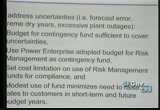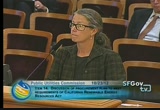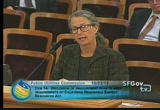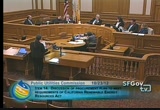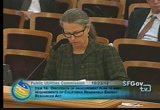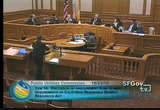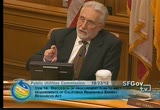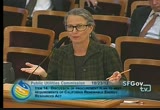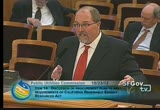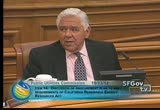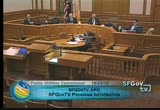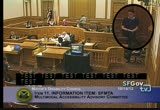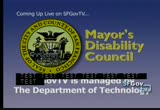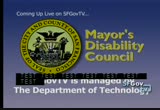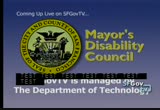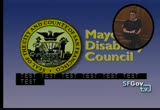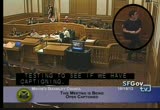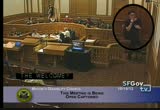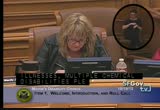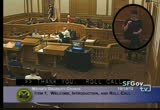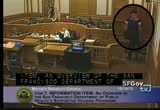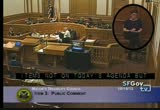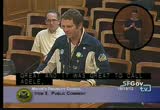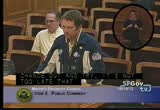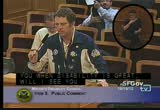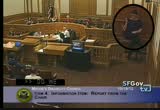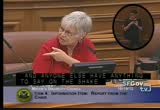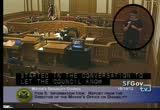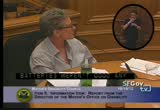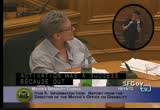tv [untitled] November 13, 2012 2:00am-2:30am PST
2:00 am
customers in future budget years. it's really a safety valve to make sure that our compliance doesn't push costs up unreasonably. president torres, you alluded to the timeline. let me put it up on the screen here so that you can see more specifically where we're at. >> right, that's good for the public to see that. >> yes. >> my other question is in terms of the rps eligible, the renewables, what percentage are we looking at in terms of renewables? we have solar, wind -- >> right. so, now our resource mix is our biogas, our hydro and solar. >> okay. >> and because we have this separate section of the rps law, we don't have to procure beyond those resources except very infrequently. and we are proposing that that
2:01 am
procurement be from renewable energy credits. >> so, the way they're titled would be appropriate? >> they would be. they would be qualified resources under state law. >> if we had -- >> if we had them, yes. >> and we have no geo thermal here? >> correct. we have purchased it in the part, but we do not have any in our portfolio today. >> where do we purchase it from? >> we purchase from the geo thermal system in guyser. >> in guyser ville? >> yes. >> are they acceptible our hydro now? >> yes, commissioner, they are accepting our hydro. yeah, another hooray, that's three in one meeting. [laughter] >> we have -- we were able through the legislative process to explain that were we to have the same rules applied to us, we would just be selling our hydro and substituting in other renewable resources. the objective of the law is to
2:02 am
in part to reduce the emissions from power plants. we don't have any power plants that emit. >> [inaudible]. >> yeah, i have a couple of questions. so, we can't bank the rps resources? >> we can. under the rules, we can -- if we have -- if we do that math equation and we have lots of extra rps compliant power, we can bank those renewable energy credits. you earlier allowed us to register with us the western system that allows folks to have those credits certified in a way that's recognized by the marketplace. we are registering those credits, then, and we can use them ourselves in a subsequent compliance year. so, for example, in this year because last year was wet, 2011 was wet, we had some extra. this year we're going to need to purchase some, but we're
2:03 am
also taking some of what we generated last year and applying it to this year. so, we're not having to purchase as much as we otherwise would have. >> and they don't expire? >> they do expire. under the regulations, they do expire. so, we would either use them or if we projected that we wouldn't need them, we would attempt to sell them before they expire. so, we extract the value one way or the other. >> that was my other question. and then i thought we budgeted in our budget for some additional renewable procurement. >> yes, we do have additional renewable procurement in our budget. some of that capacity, if you will, that financial capacity is absorbed by the power purchase agreement we have with sunset, for the sunset soler output. but we also recognize that even in any year, what we may need may need we exceed forecast.
2:04 am
we're looking at the risk management part of our line item to fund these unusual circumstances. >> and when was the last time that we weren't able to meet our needs? and i know that these rps standards are new, so, maybe we didn't have the same issues. >> we didn't have the same requirement. >> but have we been able to meet our needs with hetch hetchy with our parr? >> there have been times we had to meet short-term purchases in order to meet our needs. and maybe the best way to look at that is to again look at the first background slide i put up where you can see there are some years where a lot of our generation is considerably lower. you could tell that our retail sales pretty much track a wet year. not exactly, but in recent years, sorry, they pretty much track a dry year. so, the dry year line you see on this slide here is about where our retail sales are or
2:05 am
have been in the last 10 or so years. and, so, looking at these -- the tail end of this slide here, you can see although years we have plenty of power to cover our retail sales. >> so, one of the things this slide doesn't give you is sort of like that day to day sort of variation that happens. that's an annual sort of like slide. and when you look at it sort of by quarter or by month, great, you have lots of power in april, may, june, and you have very little in september, october, november. until the rain starts and the snow starts again. so, if there is a cycle that kind of goes on and we do do short term purchases in what we call quarter 3 and quarter 4. just to cover, you know, our existing customers. >> and that's why we'd be procuring the recs this year, right? >> yes. this is a lower than normal water year and we've had some outages. >> right.
2:06 am
>> thank you very much. >> anybody have any questions? yes, commissioner moran. >> on the -- on page 12 of the presentation where you talk about the cost limitation proposal. >> yes. >> and you have $100 per megawatt hour. >> yes. >> which is twice what the penalty level is that was set by the cpuc for pg&e. >> yes. >> what is the thinking as to why we doubled that? why do we choose to have a twice what the cpucd? >> one is a penalty is one is a cost limitation. it could certainly be lower if you prefer a lower -- to cap the amount the puc will pay at a lower level, we could. it was really just -- we're just providing that as a benchmark for you to understand sort of some of the context in which we're proposing this number. >> and the market for
2:07 am
renewables ranges from currently what to what? >> it's also about 30 to 50 megawatt premium on top of the brown power. brown power price. >> so, 30 do $50 per megawatt hour premium? >> yes. >> and this says that it would be market -- in case of an adverse market which is probably when we would most likely need to buy this stuff, it gives us some price flexibility there. >> right. to the extent that we are low on hydro -- california is low on hydro, and, so, market prices are going to be up overall as a result. >> thank you. >> what is the impact of the deductions on solar utilization? have we measured that? tax deductions that are -- >> have we measured that? we certainly realize that it lowers the cost. >> right. >> and that's why we pursued a third-party for our development of the sunset solar project. >> okay. >> and didn't fund it ourselves.
2:08 am
i can't recall off the top of my head, maybe you do, todd, what the -- mr. reedstrom, what the financial impact of that was for us. >> it was pretty significant. by way of comparison, the tax credit, tax credit financing that we successfully undertook for current sunset solar brought the average cost per kilowatt hour down to 23-1/2 cents. that compares to average costs of our hydro system. all the costs included of about 9 cents. so, without the tax credit federal financing as well as the state programs, it would have been over 30 cents kilowatt hour. >> you need to take credit for that. >> we have a line item -- >> that's why i try to raise some of these issues because when you and the work that this agency has been doing, i am so proud of the fact that the cost saving that ultimately go to the rate payer, we need to talk about. if we're going to get your trumpet so you can blow your horn, we'll do that.
2:09 am
you should be commended because you've been taking into account, you've been a steady steward of the process and look what it's producing for the rate payer here in san francisco. i'm sure most jurisdictions, knowing some of the mayors in those other jurisdictions, i don't think they've had as good a record as we've had here in san francisco. i want to say thank you. i think it's important to bring it out into the public view. >> thank you. it's definitely a team effort. a lot of detail. >> no question it's a team effort. my comments were directed to the team. any other comments? we don't need to accept anything. [speaker not understood]. >> there's no action. >> right, no action necessary. i guess there is an action necessary to go into executive session, closed session. >> thank you. >> any public comments before we move into closed session? all right, we need a motion to assert the attorney/client privilege. >> move to assert the attorney/client privilege. >> second. all those in favor signify by saying aye. >> aye. >> all right. >> closed session items, item
2:10 am
17, existing litigation lennon versus city and county of san francisco. item 18, existing litigation cadmin versus city and county of san francisco. item 19, existing claim, chung versus city and county of san francisco. and item 20, existing litigation city and county of san francisco versus pacific run and gun club. >> let the record show that the private session [inaudible]. >> i would like to make a motion not to disclose -- [inaudible]. >> [inaudible]. >> aye. >> [inaudible]. [adjourned] .
2:15 am
2:16 am
2:17 am
shall we start over again? good afternoon, ladies and gentlemen, welcome to the mayor's disability council. denise, would you please read the welcome? >> i'm almost afraid. try again. let me turn on the mic, i'm on. welcome, everyone and thank you for the third time for waiting. we're going it kind of give you highlights of our accessibility policy here at city hall so bear with me as i go through some of the information. city hall is accessible to persons using wheelchairs and other disabilities. the polk street carlton b. goodlett entrance is accessible via a
2:18 am
ramp and wheelchair lift. assistive listening devices are available and the meeting will be sign language and captioned. agendas are available in large print and braille. in order to accommodate people with severe allergies, environmental illnesses, multiple chemical disabilities please refrain from wearing skepblted products to mdc meetings or to the mayor's office on disabilities. this includes perfume, scented lotions, hair sprays. thank you for helping provide the meetings are fully accessible for people with disabilities. for people with disabilities or others who cannot attend the meetings in person, welcome to view our broadcast which is open captioned on sfgtv channel 26. you can also call the bridge line atary code
2:19 am
415-554-9632. thank you and again welcome to the meeting. >> thank you. roll call. (roll called). >> next we'll have reading and approval of the agenda. mayor's disability council friday, october 19, 2012. 1, introduction, welcome and roll call. 2, action item, reading and approval of the agenda. 3, public comment. items not on today's agenda but within the jurisdiction of the mdc each
2:20 am
speaker is limited to 3 minutes. information item, 4, report from the chair. information item, 5, report from the director of the mayor's office on disability. 6, information item from the department of aging and adult services, the san francisco transitional care program. item 7, information item, an overview of the san francisco department of public health supportive housing programs. break at 2.30. 8, information item, report from the physical access committee. 9, information item, report from the disability disaster preparedness committee. 10, the november election, access to information, polling places and voting machines. 11, information item, sfmta multi modal accessibility advisory committee update. 12, public
2:21 am
comment items not on today's agenda but within the jurisdiction of the mdc 13, information item, correspondence. 14, discussion item, council member comments and announcements. 15, adjourn. >> thank you, ken. item no. 3, public comment. items not on today's agenda but within the jurisdiction of the mdc each speaker is limited to 3 minutes. the first person i have is walter. would you come up, please. >> there it goes. good afternoon, mayor's
2:22 am
disability council. just wapted -- wanted to let you know that hovaround takes me where i want to go, where will it send me next? and i was hoping that adele was going to be here because i was on her show and it was great and it was great to call adele, ring per bell, ding, ding, ding aling alink, you can ring adele, ring her bell, ring ading, make your city swell, disability make it well. i did want to say it's got a
2:23 am
disability morning after if we can hold on through the city night. we have a chance to find the city sunshine, let's keep on looking for the light. it's not too late, not while we're living, let's take a chance out and try, it's not too late that we should be giving, let's put our hands out and pray. we'll won't be searching any more, won't be searching any more for better. end. wheels in the sky keep on turning, you're gonna be bike riding with disability tomorrow. wheels in the sky
2:24 am
keep on turning i know you're gonna be learning disability with wheels tomorrow. see you in next meeting, see you when disability is great. will i see you with disability better and i don't hope we have to wait. and stayed in bed all morning with disability just to pass the time. i want better now and there can be no denying. city is changing or maybe it just stopped trying. but it's
2:25 am
not too late you really try and try to make it. >> okay, thank you, walter. the next item is no. 4, information item. oh, i'm sorry, carla. >> do we have rachel hyatt from san francisco county transportation? did she turn in a speaker card? >> no. >> is rachel hyatt from the san francisco transportation authority here? i guess not. okay, we'll go on and wait for her to come this and we'll get to her when she gets here. okay, item information, report from the chair. today is friday, october 19th. i hope everyone participated in the shake out yesterday.
2:26 am
and if not, it's a good reminder that everyone should have a kit ready for just in case of emergency in case you have it evacuate your house, you should have an emergency kit ready under your bed or in a closet or somewhere so you can do that. and anyone else have anything to say on the shake out? did anyone participate? did you want to say something? >> at our agency we had i think over 100 individual persons there that had participated in the shake out or evacuation location was yerba buena gardens and we set up a camp and it went very smoothly. it worked very well. >> oh, great. all right. moving on to item no. 4 -- 5,
2:27 am
i'm sorry. report from the director. carla. >> yes, thank you, chair james. great minds think alike. it's october, the election is coming up soon, the giants are still in the ballgame and so that's a good time to talk about disasters. i wanted to build on what you started in the conversation to let the council know that our office also observed shake out activities yesterday. just as a quick reminder, it was 23 years ago this last week that we had the loma prieta earthquake which of course started during the world series event, and california has been using the october opportunity as a way to promote earthquake preparedness pretty much ever since. so what the mayor's order on disability did yesterday was have a staff meeting and talked
2:28 am
about our role in the city's emergency preparedness care and focused on the mass care and emergency operations in the city. then at 10.18 i blew the whistle and we all did a duck, cover and whoeld on. the exercise was good because as we pulled out our merchandise supplies of course we found a few flashlights that the batteries weren't good any more, there were some missing hard hats and safety vests and such. it's always a reminder to refresh your supplies so we appreciated that. what we also did, though, was we used the shake out opportunity as a way to activate our statement of understanding program. and we had a scenario where there was no email that was available, there were no phone lines that were available, so the only communications that we had at our disposal were our cell phones to send text messages. so we sent out text messages to
2:29 am
all 12 of our partner agencies in the community and asked our partners to respond and to let us know if they had any resources that they could offer to the city to help the city support people with disabilities in the shelter operations. and i'm really very proud to say that that activation was a success because out of those 12 sou partners, 11 of our partners responded so we were very pleased with that outcome. we also went to the department of emergency management emergency operations center as well where sf card was running an activation with other members of the community. so that concludes my great shake out report. i wanted to give some information to the council about some legislation that was introduced this week before the board of supervisors. this is legislation that was
123 Views
IN COLLECTIONS
SFGTV: San Francisco Government Television Television Archive
Television Archive  Television Archive News Search Service
Television Archive News Search Service 
Uploaded by TV Archive on

 Live Music Archive
Live Music Archive Librivox Free Audio
Librivox Free Audio Metropolitan Museum
Metropolitan Museum Cleveland Museum of Art
Cleveland Museum of Art Internet Arcade
Internet Arcade Console Living Room
Console Living Room Books to Borrow
Books to Borrow Open Library
Open Library TV News
TV News Understanding 9/11
Understanding 9/11